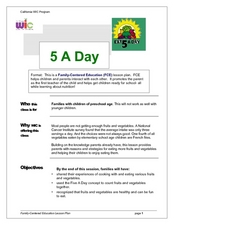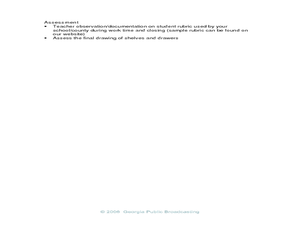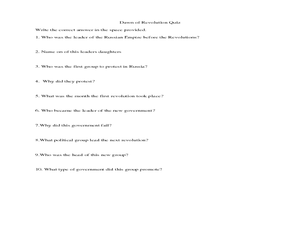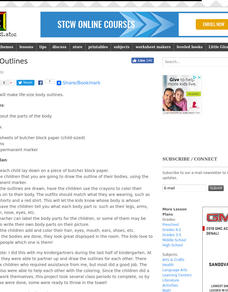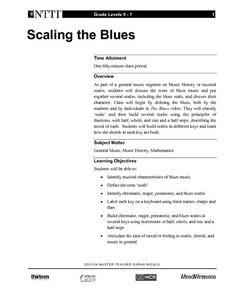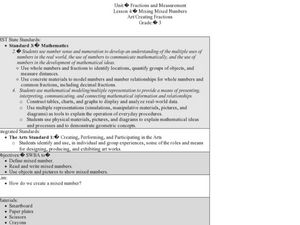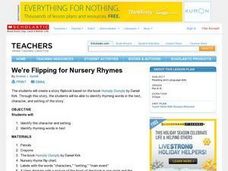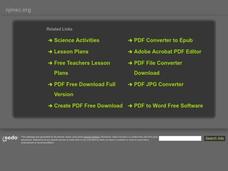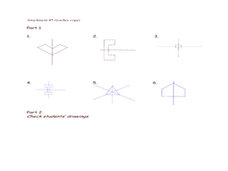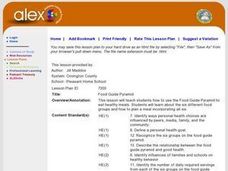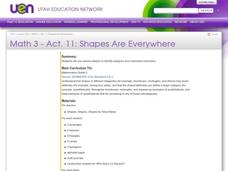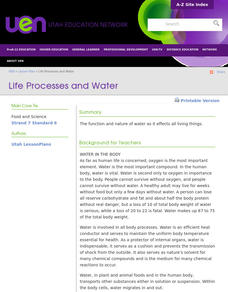Curated OER
5 A Day
Students examine the 5 a day program. They sing different songs and discover how to be healthy. They identify different parts of the music as well.
Curated OER
Shelves and Drawers: A Fraction Lesson
Second graders explore fractions as something shared evenly. In this fractions lesson, 2nd graders watch a video and discuss how bookcases and drawers could be divided evenly.
Curated OER
Russian Revolution Part 1
Ninth graders consider how the outcome of World War I contributed the Russian Revolution. In this Russian Revolution lesson, 9th graders watch the movie "Anastasia," and discuss the conditions that led to revolution in Russia.
Curated OER
Place Value Practice (Tenths)
Students practice strategies solving problems with basic facts, framework, domain and early additive part-whole. They recall the compatible numbers to ten, solve problems with small numbers using a part-whole strategy and recall ten and...
Curated OER
Body Outlines
Students trace their bodies onto butcherblock paper and then add clothes, hair, eyes, mouths, etc. They use them to identify their body parts.
Curated OER
Stirring up Fractions
Second graders practice unit fractions to identify parts of the whole and parts of a set. They utilize a variety of manipulative's including recipe boxes to get them started stirring up fractions. A multitude of books on fractions are...
Curated OER
Scaling the Blues
Students identify musical characteristics of blues music and define the term 'scale.' They identify chromatic, major, pentatonic, and blues scales and label each key on a keyboard using letter names, sharps and flats.
Curated OER
Mixing Mixed Numbers Art/Creating Fractions
Third graders explore number values by participating in class math activities. In this fractions lesson, 3rd graders collaborate with classmates to discuss the technique of adding mix numbers while utilizing paper plates to help...
Curated OER
Symmetry in My World
Second graders demonstrate understanding of symmetry and identify objects that have symmetry. They use a mirror to get a visual illustration of what symmetry is. They create a collage of symmetrical pictures they find in magazines.
Curated OER
We're Flipping for Nursery Rhymes
Students read a variety of nursery rhymes with a focus on "Humpty Dumpty". While reading, they identify the words that rhyme along with the setting, plot and characters. To end the lesson, they complete a Venn Diagram comparing "Humpty...
Curated OER
Animal Signs
Students discuss the many different types of animal signs that can be used to identify and track animals. They participate in an hands-on activity in which they examine tracks, trails, homes, territory markings, and even "scat" left by...
Curated OER
Fractions
First graders create fraction creatures by using 1 inch squares of construction paper. In this fractions lesson plan, 1st graders name the fractions within their whole creatures.
Curated OER
Symmetry, Similar & Congruent Shapes
Fifth graders identify lines of symmetry., similar and congruent shapes. They use construction paper to create their own symmetrical shapes. Students create stained glass frames containing symmetrical, congruent and similar shapes.
Curated OER
Systems of Linear Inequalities
The class solves systems of linear inequalities. They graph lines and identify the point of intersection.They graph lines and identify the boundary that represent the solution and solution set.
Curated OER
Classification and Identification
Students, after exploring and analyzing diagrammatic and taxonomic keys and their association to marine sciences, identify and classify objects and organisms based on visual attributes/characteristics. They research and create their own...
Curated OER
Symmetry and Tangrams
Sixth graders build figures out of tangrams. In this symmetry instructional activity, 6th graders view tangrams and identify the polygons included in them. Students divide into groups, identify their tangram pieces, define the lines of...
Curated OER
Ink Analysis and Thin Layer Chromatography
Students explain the process of TLC. They identify at least three components of ink. They analyze data and make conclusions based on laboratory observations.
Alabama Learning Exchange
Food Guide Pyramid - TV and Peers
Students identify foods that belong in each group on the food guide pyramid. They discuss how TV and peers may negatively influence eating habits.
Curated OER
Propaganda & Persuasive Techniques: Do You Buy It?
Fifth graders investigate the basic persuasive techniques employed in advertising. They identify three examples of propaganda/persuasive techniques, complete an observation chart, take an advertising quiz, complete a spreadsheet that...
Curated OER
Shapes Are Everywhere
Third graders use various shapes to identify polygons and understand symmetry. They explore pattern blocks noticing their similarities and differences, then share with other team members. They draw 3 polygons in their journals and...
Curated OER
Chem 152-Electrochemistry
In this electrochemistry worksheet, learners solve a variety of problems including identifying parts of oxidation and reduction reactions, writing balanced equations for galvanic cells, determining free energy and equilibrium constants...
Curated OER
How Do Toxins Affect the Human Body?
Young scholars study toxins. In this biology lesson plan, students identify toxins contained within household products and determine specific affects that toxins may have on the human body.
Curated OER
Growth of a River
Students evaluate geography by drawing an image in class. In this river lesson, students identify a list of vocabulary terms associated with bodies of water. Students identify how a river is formed and draw a picture of one including the...
Curated OER
Life Processes and Water
Explain the properties of water. Identify the properties of water that make it a polar molecule Describe hydrogen bonds and how they differ from covalent bonds Discuss the differences between hard water and soft water Compare the heat of...
